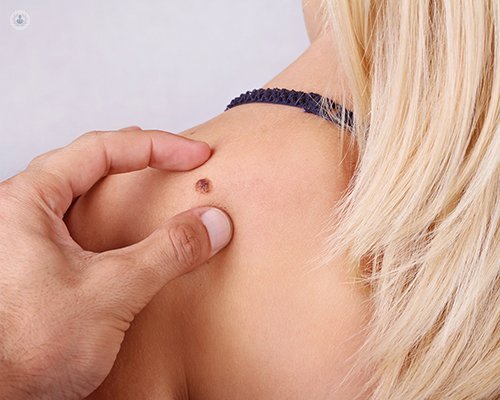The 3 most common types of skin cancer
Written by:
Whilst there are dozens of different forms of skin cancer, the three most common and important are melanoma, squamous cell carcinoma (SCC) and basal cell carcinoma (BCC). Melanoma commonly present as new or changing moles. Squamous cell carcinoma tends to present as persistent skin coloured, or red, raised bumps on the skin, often associated with pain or tenderness. Basal cell carcinoma may have a more varied appearance.

How dangerous are the different forms of skin cancer?
Of the three, melanoma is the most serious type of skin cancer and can spread to other parts of the body. When found early it can often be treated successfully. Squamous cell carcinomas are not usually life threatening however can cause complications by their growth or through spread to other parts of the body. Early treatment is often curative.
Basal cell carcinoma, in contrast, tends to cause problems by growing deeper or wider into the surrounding skin and deeper structures.
What is basal cell carcinoma?
Basal cell carcinoma arises from basal cells, which are found at base of the epidermis, or top layer of skin. Most are thought to be caused by long-term sun exposure and arise in older adults. Rarely, they are seen in patients under the age of 20 years.
What are the symptoms of basal cell carcinoma?
Most BCCs develop on the head and neck.
Nodular basal cell carcinomas often appear as a pink, red, or translucent bump on the skin with tiny surface vessels. They may easily bleed or scab. In darker skinned patients they may be pigmented.
Superficial basal cell carcinomas are often seen on the chest and back as flat, scaly red-pink patches.
Less commonly BCCs may present as non-healing sores or ulcers, sometimes with a raised rolled edge. Least commonly they may present as a white or yellow waxy scar like area.
How is skin cancer treated?
Skin cancers are most commonly treated surgically, which is often curative when diagnosed early. Options include:
- Curettage and cautery, where the skin cancer is scraped from the skin and the exposed surface sealed
- Surgical excision where the skin cancer is removed with a margin of normal skin. The wound is then stitched together, but may require a graft or a flap.
- Mohs surgery where skin layers are progressively removed and tested under the microscope until no skin cancer cells remain. For some non-melanoma skin cancers this reduces the risk of recurrence and can spare healthy surrounding skin.
- Radiotherapy can be used for patients who cannot undergo surgery or who do not want to undergo surgery.
- Certain creams and ointments can be effective in treating low-risk basal cell carcinoma
- For skin cancers that have spread (metastasised) there are a number of new highly effective medications that have been developed over the last few years.
What should you do if you find signs of skin cancer?
If you are concerned about a new or changing mole or have signs of a non-melanoma skin cancer, arrange to see a dermatologist with expertise in skin cancer as soon as possible.


